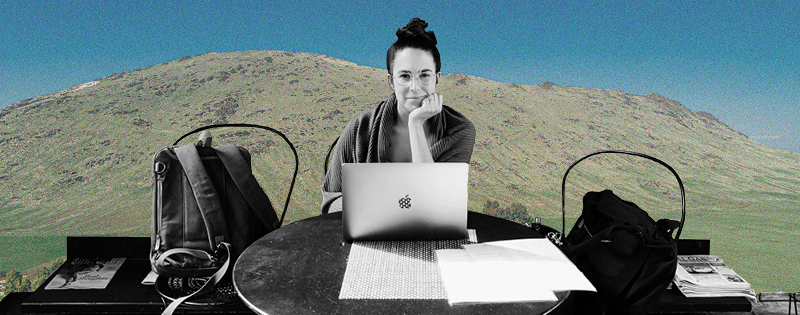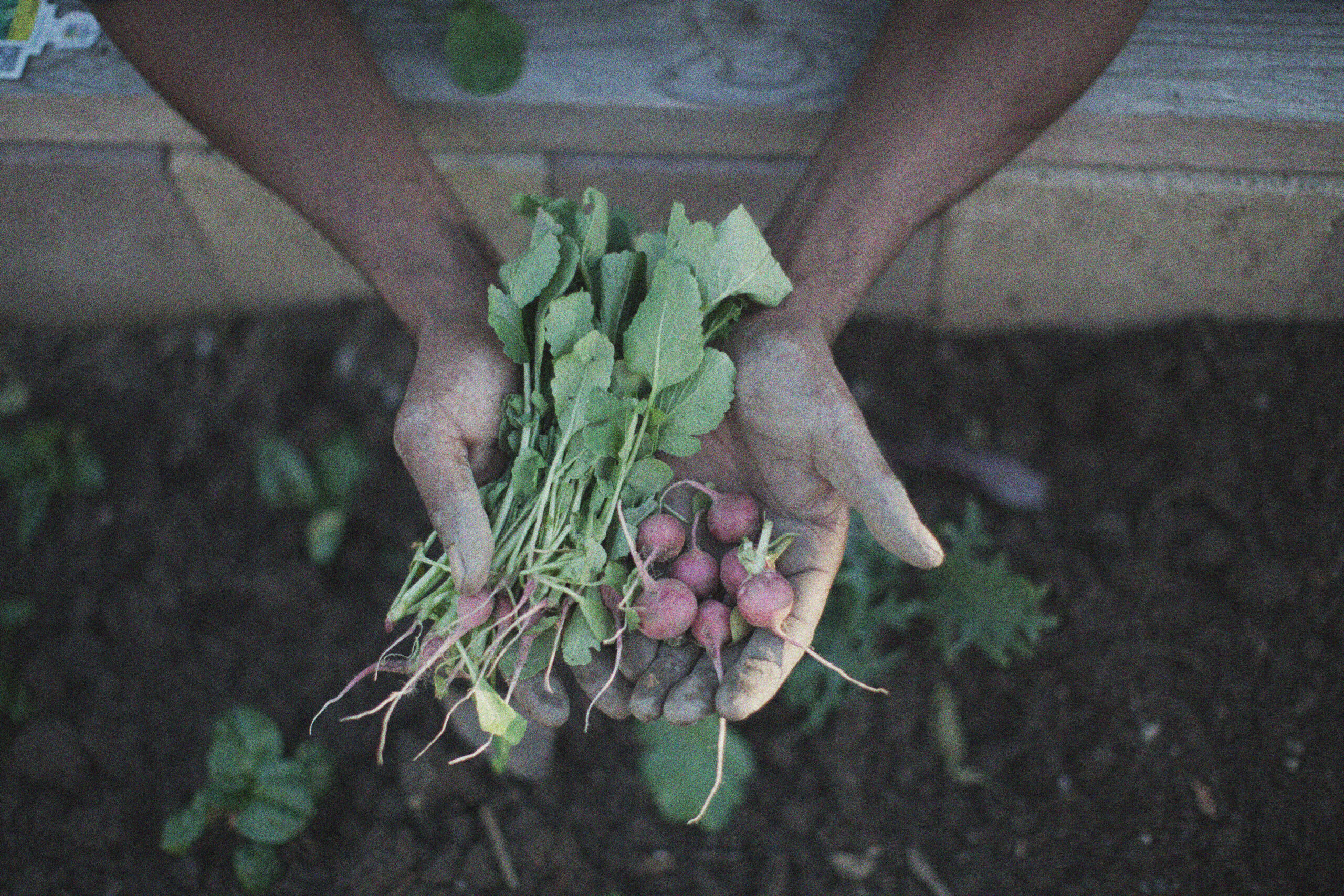
Kat Armas (MDiv, MAT ’20) is a Cuban-American writer and podcaster from Miami, Florida. Her first book, Abuelita Faith: What Women on the Margins Teach Us About Wisdom, Persistence, and Strength, sits at the intersection of women, Scripture, and Cuban identity. She also explores these topics on her podcast, The Protagonistas, which centers the voices of Black, Indigenous, and other women of color in church leadership and theology. She will begin a ThM at Vanderbilt Divinity School in Spring 2022. See more of her work at katarmas.com.
Jerome Blanco: Why don’t we start with the big question: What is abuelita theology?
Kat Armas: I mention in my book that abuelita theology is difficult to define, and I think this is true for two reasons: First, abuelita theology is birthed from the lived experiences of our abuelitas throughout history. And as we know from being human, lived experiences are multifaceted. Through their everyday experiences, our abuelitas have shown us what it means to live a life of faith, and oftentimes—due to their marginalization—this flows from their basic need to survive. Thus, abuelita theology is messy and informal and, overall, rooted in survival. Second, abuelita theology is deeply personal. We are each formed by the witness of our ancestors—those who influenced us directly and those whose shoulders we now stand on. I argue that, in many situations, it’s the often-overlooked women of faith who have deeply influenced us and informed our understandings and views of God. Because it looks different for each of us, I like to say that there’s not one abuelita theology, but multiple abuelita theologies birthed from the lived experiences of those who’ve gone before us.
JB: I love the way you put that. On the one hand, we might think this would be apparent, that our spiritual formation has been deeply shaped by this informal, messy, on-the-ground faith of women who came before us. On the other hand, we’ve somehow been socially trained to ignore the magnitude of this influence. There is a reverence toward the academy—its traditional canon and theologies, largely dominated by White Western male voices, and often disembodied and separate from the “lived experiences” you talk about. How did we get to this point? How have we brought ourselves to think about theology in this way?
KA: I think it has to do with notions of formality, hierarchy, and how we as a society value education (Western education, specifically). Of course education is important. After all, I do have two master’s degrees and am still continuing my education! But for many of us, the lived experiences of our ancestors, particularly the women who came before us, isn’t typically seen as valuable as formal education. The history of colonization and its effects on us have convinced us that the White Western male is at the top of the hierarchy, possessing “true” knowledge about God—or knowledge about the “true” God. Black scholar Willie Jennings explains in his book After Whiteness that the image of the educated person in Western culture is that of a White self-sufficient man. His self-sufficiency, Jennings argues, is defined by possession, control, and mastery. Western culture has long made the rules about what is “knowledge” and what is not, positioning certain people as controllers, possessors, masters, and thus as teachers of knowledge. This has resulted not only in homogeneity—“a control that aims for sameness and a sameness that imagines control,” as Jennings puts it—but in the marginalizing or silencing of anyone from outside the White elite academy.
JB: How do we move away from this way of thinking when we have been shaped to think this way for so long? How do we train ourselves to lean into, celebrate, and center these marginalized voices and experiences—these abuelita theologies?

Kat Armas (MDiv, MAT ’20) is a Cuban-American writer and podcaster from Miami, Florida. Her first book, Abuelita Faith: What Women on the Margins Teach Us About Wisdom, Persistence, and Strength, sits at the intersection of women, Scripture, and Cuban identity. She also explores these topics on her podcast, The Protagonistas, which centers the voices of Black, Indigenous, and other women of color in church leadership and theology. She will begin a ThM at Vanderbilt Divinity School in Spring 2022. See more of her work at katarmas.com.

Jerome Blanco (MDiv ’16) is editor in chief of FULLER magazine and Fuller’s senior content editor.
Kat Armas (MDiv, MAT ’20) is a Cuban-American writer and podcaster from Miami, Florida. Her first book, Abuelita Faith: What Women on the Margins Teach Us About Wisdom, Persistence, and Strength, sits at the intersection of women, Scripture, and Cuban identity. She also explores these topics on her podcast, The Protagonistas, which centers the voices of Black, Indigenous, and other women of color in church leadership and theology. She will begin a ThM at Vanderbilt Divinity School in Spring 2022. See more of her work at katarmas.com.
Jerome Blanco: Why don’t we start with the big question: What is abuelita theology?
Kat Armas: I mention in my book that abuelita theology is difficult to define, and I think this is true for two reasons: First, abuelita theology is birthed from the lived experiences of our abuelitas throughout history. And as we know from being human, lived experiences are multifaceted. Through their everyday experiences, our abuelitas have shown us what it means to live a life of faith, and oftentimes—due to their marginalization—this flows from their basic need to survive. Thus, abuelita theology is messy and informal and, overall, rooted in survival. Second, abuelita theology is deeply personal. We are each formed by the witness of our ancestors—those who influenced us directly and those whose shoulders we now stand on. I argue that, in many situations, it’s the often-overlooked women of faith who have deeply influenced us and informed our understandings and views of God. Because it looks different for each of us, I like to say that there’s not one abuelita theology, but multiple abuelita theologies birthed from the lived experiences of those who’ve gone before us.
JB: I love the way you put that. On the one hand, we might think this would be apparent, that our spiritual formation has been deeply shaped by this informal, messy, on-the-ground faith of women who came before us. On the other hand, we’ve somehow been socially trained to ignore the magnitude of this influence. There is a reverence toward the academy—its traditional canon and theologies, largely dominated by White Western male voices, and often disembodied and separate from the “lived experiences” you talk about. How did we get to this point? How have we brought ourselves to think about theology in this way?
KA: I think it has to do with notions of formality, hierarchy, and how we as a society value education (Western education, specifically). Of course education is important. After all, I do have two master’s degrees and am still continuing my education! But for many of us, the lived experiences of our ancestors, particularly the women who came before us, isn’t typically seen as valuable as formal education. The history of colonization and its effects on us have convinced us that the White Western male is at the top of the hierarchy, possessing “true” knowledge about God—or knowledge about the “true” God. Black scholar Willie Jennings explains in his book After Whiteness that the image of the educated person in Western culture is that of a White self-sufficient man. His self-sufficiency, Jennings argues, is defined by possession, control, and mastery. Western culture has long made the rules about what is “knowledge” and what is not, positioning certain people as controllers, possessors, masters, and thus as teachers of knowledge. This has resulted not only in homogeneity—“a control that aims for sameness and a sameness that imagines control,” as Jennings puts it—but in the marginalizing or silencing of anyone from outside the White elite academy.
JB: How do we move away from this way of thinking when we have been shaped to think this way for so long? How do we train ourselves to lean into, celebrate, and center these marginalized voices and experiences—these abuelita theologies?
Kat Armas (MDiv, MAT ’20) is a Cuban-American writer and podcaster from Miami, Florida. Her first book, Abuelita Faith: What Women on the Margins Teach Us About Wisdom, Persistence, and Strength, sits at the intersection of women, Scripture, and Cuban identity. She also explores these topics on her podcast, The Protagonistas, which centers the voices of Black, Indigenous, and other women of color in church leadership and theology. She will begin a ThM at Vanderbilt Divinity School in Spring 2022. See more of her work at katarmas.com.
Jerome Blanco (MDiv ’16) is editor in chief of FULLER magazine and Fuller’s senior content editor.
KA: It’s hard! Particularly when we’ve been trained to value certain types of knowledge and experiences over and above others. But I think there are a few ways we can be intentional about moving away from this thinking. For one, it’s important to lean into non-Western ways of being and knowing. What are some ways that we have been ministered to or have learned from embodied knowledge? How can we pay attention to our bodies and the wisdom they hold? What can we learn from the land—our plants and animal kin? In this way our ancestors were wise beyond belief, and it is by these embodied ways of being and knowing that our abuelitas were shaped and formed. What lessons have our abuelitas passed on to us from their lived experiences? From their seeking to survive in a world that overlooks them? I believe my abuela lived out her spirituality most powerfully in how she was present in her garden and in how she provided for us through her cooking and sewing. She nourished us and provided for us by setting tables for our family and those in her community. I’m learning to lean into these forms of embodied wisdom and spirituality—and more specifically, I’m learning to look for God there, too.

JB: You model this really well in your book. You weave together the personal stories of the women in your life, the legacies of women in history, but also women in the Bible, who are too often overlooked.
KA: Yes! Reflecting on the women in the Bible is what helped me recognize abuelita faith so clearly. As I read Scripture through this lens, I began to see how so many women and their stories of survival mirrored the story of my abuela—particularly in how they lived out an embodied faith. One such story is that of the disciple Tabitha in Acts 9. She offers a beautiful example of a faith that is rooted in the wisdom of the body and in the work of the hand. When Peter arrived at her deathbed, the widows whom Tabitha cared for were weeping and showing him the tunics that she had made for them. We don’t know much about Tabitha, but it’s striking—and moving—that this is the primary detail we are given of her life and ministry: a woman who provided for her community through her creativity and the work of her hands. This makes me think of my own abuela who, like Tabitha, provided for our family and served her community through her own clothes-making business that she ran from home. It was part of her survival, but it was also an integral part of her spirituality. God was present in the needle and in the thread and in the intentionality she put into her craft. I imagine the same was true for Tabitha.
JB: There’s such a communal aspect to what you’re talking about, both in the way we learn from the lives and stories of others but also in the way these women’s stories of faith have so much to do with their blessing and being a part of their communities. Can you talk about how community plays a role in abuelita theology?
KA: In Latinx/a/o spaces, we say that theology is done en conjunto, or together, as a whole. As I mention in my book, theology is lived. It doesn’t take place just in the mind but in the body as we engage with and learn alongside others. I learned about God while in the garden with my abuela picking avocados from the tree for our afternoon snack. I learned about God while the black beans were simmering on the stove and my family sat around the table sharing stories of life in Cuba. My understanding of God is shaped not only from my experiences but from the community around me—those who formed me in both the past and present. I think this is key to abuelita theology.
JB: What are hopes that you have for the church and for communities as they more deeply embrace abuelita theologies? What tangible shifts do you envision as a result? How have you already seen this at work?
KA: The central question I ask in Abuelita Faith is: “What if the greatest theologians the world has ever known are those whom the world wouldn’t consider theologians at all?” This is a question I hope everyone wrestles with long after they read my book—particularly as they take its insights and stories with them to their communities. My greatest desire is that the church in the US will learn to recognize and celebrate God’s activity in places—and in people—it was never trained to look at. I hope that in doing so, the church will lean into ancestral wisdom and embodied wisdom on their journeys of faith. Most importantly, I hope this leads us to see a shift in power within the church—a shift, I believe, Jesus fought for as he not only interacted with folks on the margins but actively challenged those with power. As that shift happens, I know other beautiful things will happen, too. I’ve started to see this shift in small ways when I talk to folks who’ve read the book. I see how something has been illuminated in them. I hear it in their voices as they tell me the stories about their own grandmothers and the women in their lives who have guided them and led them and carried them. I hope that these personal, internal shifts are precursors to greater, societal ones.
Sebastian C. H. Kim, academic dean for Fuller’s Korean Center, talks about the dynamics of influence between the Korean and the American churches, as well as the transformation of the global church in an increasingly interconnected world.